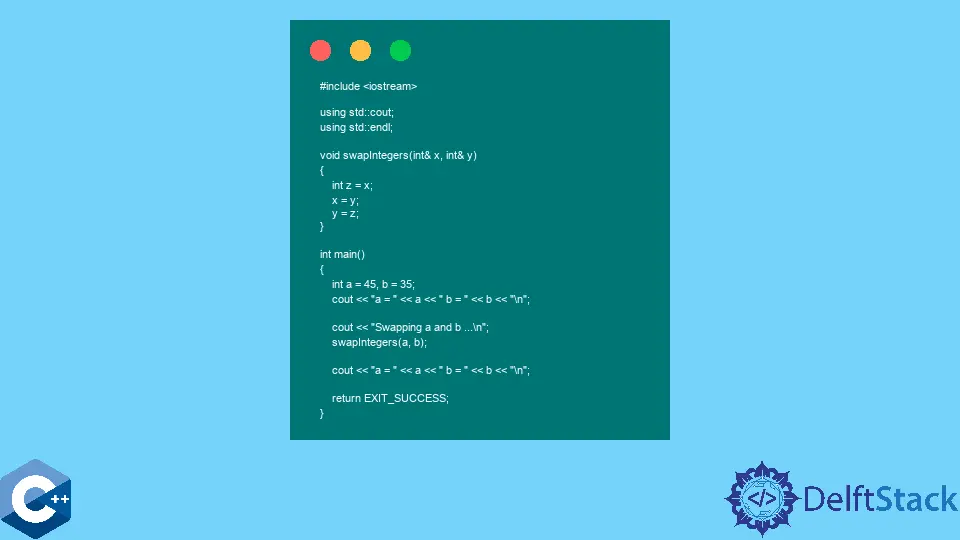在 C++ 中按引用传递参数与按指针传递参数的比较
-
在 C++ 中使用
&variable表示法通过引用传递函数参数 -
在 C++ 中使用
*variable符号通过引用传递函数参数 -
使用
(&array_variable)[x][y]表示法通过 C++ 中的引用传递 2D 数组

本文将介绍几种在 C++ 中通过引用传递参数与通过指针传递参数的方法。
在 C++ 中使用&variable 表示法通过引用传递函数参数
传递参数是函数的最常见功能,可为不同代码块之间的数据交换提供灵活的接口。每次调用函数时,都会通过传递的参数来创建和初始化其参数。通常,为传递参数而区分两种方法:按值传递和按引用传递,后者使参数成为相应参数的别名。在下面的示例中,我们演示一个基本的整数交换函数,其中参数由引用传递,并使用 int &var 表示法。当 swapIntegers 函数返回时,main 函数范围内的 int 对象被修改。
#include <iostream>
using std::cout;
using std::endl;
void swapIntegers(int& x, int& y) {
int z = x;
x = y;
y = z;
}
int main() {
int a = 45, b = 35;
cout << "a = " << a << " b = " << b << "\n";
cout << "Swapping a and b ...\n";
swapIntegers(a, b);
cout << "a = " << a << " b = " << b << "\n";
return EXIT_SUCCESS;
}
输出:
a = 45 b = 35
Swapping a and b ...
a = 35 b = 45
在 C++ 中使用*variable 符号通过引用传递函数参数
可以使用指针来实现与上一个示例相似的行为。请注意,指针是对象的地址,可以使用*运算符对其进行取消引用以访问对象的值。使用指针传递参数意味着我们可以从函数范围访问给定对象并修改其值,以便在返回后保留状态。请注意,要传递指向函数的指针,需要使用地址操作符(&)进行访问。
#include <iomanip>
#include <iostream>
using std::cout;
using std::endl;
using std::setw;
void swapIntegers2(int* x, int* y) {
int z = *x;
*x = *y;
*y = z;
}
int main() {
int a = 45, b = 35;
cout << "a = " << a << " b = " << b << "\n";
cout << "Swapping a and b ...\n";
swapIntegers2(&a, &b);
cout << "a = " << a << " b = " << b << "\n";
return EXIT_SUCCESS;
}
输出:
a = 45 b = 35
Swapping a and b ...
a = 35 b = 45
使用 (&array_variable)[x][y] 表示法通过 C++ 中的引用传递 2D 数组
有时将二维 C 语言样式数组引用传递给该函数可能很方便,但是这种表示方式有点不直观,可能导致错误的结果。如果我们有一个带有任意 SIZE 维的整数数组,则可以从函数参数中使用以下表示法引用它-int (&arr)[SIZE][SIZE]。注意,缺少括号 () 将被解释为对 int 对象的引用数组,并导致编译错误。
#include <iomanip>
#include <iostream>
using std::cout;
using std::endl;
using std::setw;
void MultiplyArrayByTwoV2(int (&arr)[SIZE][SIZE]) {
for (auto& i : arr) {
for (int& j : i) j *= 2;
}
}
void printArray(int (&arr)[SIZE][SIZE]) {
for (auto& i : arr) {
cout << " [ ";
for (int j : i) {
cout << setw(2) << j << ", ";
}
cout << "]" << endl;
}
}
constexpr int SIZE = 4;
int main() {
int array_2d[SIZE][SIZE] = {
{1, 2, 3, 4}, {5, 6, 7, 8}, {9, 10, 11, 12}, {13, 14, 15, 16}};
MultiplyArrayByTwoV2(array_2d);
printArray(array_2d);
return EXIT_SUCCESS;
}
输出:
[ 2, 4, 6, 8, ]
[ 10, 12, 14, 16, ]
[ 18, 20, 22, 24, ]
[ 26, 28, 30, 32, ]
Founder of DelftStack.com. Jinku has worked in the robotics and automotive industries for over 8 years. He sharpened his coding skills when he needed to do the automatic testing, data collection from remote servers and report creation from the endurance test. He is from an electrical/electronics engineering background but has expanded his interest to embedded electronics, embedded programming and front-/back-end programming.
LinkedIn